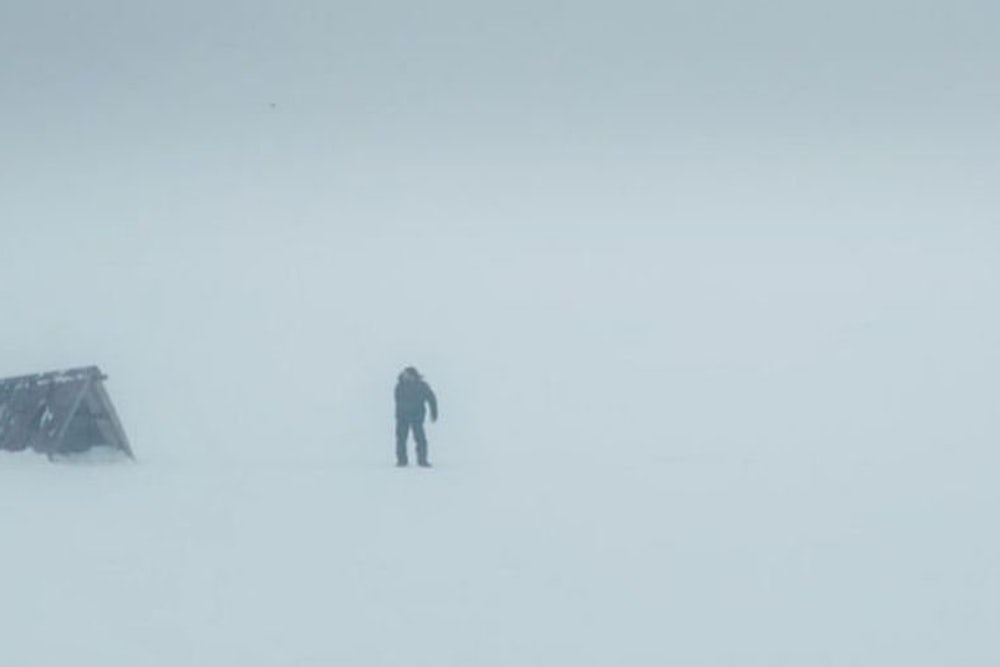“Fortitude,” the wintry new psychological thriller about murder, the arctic, and environmental collapse, ends its first-season run Thursday on the cable channel Pivot. Starring Stanley Tucci and set in an otherworldly Arctic icescape, it’s one of this season’s most visually interesting new shows, a scientific twist on Cronenbergian body horror. Nothing about “Fortitude” is traditional and that’s surprising, given how familiar much of its subject matter seems. Named after the town in which it’s set, “Fortitude,” which has just been renewed for a second season, started off as a murder mystery and devolved into a tale of ecological destruction—where the real danger is the slowly melting earth.
Sometimes described as “Fargo” meets “Twin Peaks,” “Fortitude” can sustain that comparison along with many others: At different points it calls to mind “Northern Exposure,” The Thing, “Top of the Lake,” and “The Strain,” to name a few—all shows rooted in a long, largely American tradition of disturbing events in towns so isolated and small that only true eccentrics would choose to live there. That “Fortitude” isn’t American partially explains its originality; that it’s set in a landscape that rubs out any sign of national character at all explains the rest.
Prestige television has tended to flow one way, with American networks producing adaptations of British shows like “The Office” and “House of Cards.” The American versions tend to warm, polish, and smooth—they’re gentler and longer than their awkward, more experimental British originals. To the extent that “Fortitude” is in dialogue with Lynch and Carpenter, it reverses the direction of creative traffic across the pond. What does a British take on a largely American subgenre looks like? More to the point, what happens when you subtract the American-ness from that largely American formula?
“Fortitude”’s answer is a blurry and discomfiting blankness:
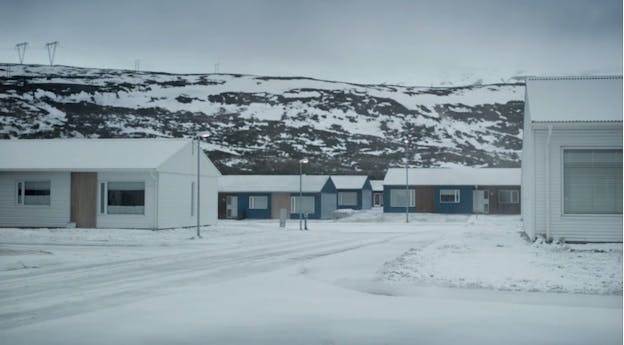
I spoke with Simon Donald, the Scottish creator of “Fortitude,” whose friendly openness seems wholly at odds with the intense, isolated, severe sensibility of the show. He isn’t an auteur who coolly withholds. Donald wants to tell you: about the search for an environment that would allow the rare combination of permafrost and humans he needed for his story, about when he first saw The Thing and an audience member “got up out of the chair and started to scream and fall about” because—as a newspaper later explained—they’d “internalized the horror.” That was his goal with “Fortitude.”
In the first episode we learn that there is no crime in Fortitude because there is no unemployment, and that as a consequence no one knows whether the local sheriff is “a good sheriff or a bad sheriff.” Another informs us that no one is allowed to die in the town because nothing decays—corpses still carry plague. Fortitude, at least in theory, seems incredibly innocent: a wintry Eden. But if there’s a vaguely utopian quality to “Fortitude”’s premise that there’s no unemployment and everyone can support themselves, it expresses differently in the show’s visual style, which takes snow’s ability to blanket difference with sameness to a cinematic extreme.

It’s strikingly different from American TV, where isolated environments tend to inspire riffs on the frontier myth and register an interest in charting territories, psychically as well as geographically. The moose that strolls down the main street of Cicely, Alaska, in “Northern Exposure”’s opening credits, for instance, offers an instant shorthand for the town and for how nature intersects with it. We learn that humans and wild animals coexist in Cicely in a state of mutual bemusement. “Fortitude,” by contrast, opens with a man screaming as he’s being eaten by a polar bear.
As that original death collapsed into comparative irrelevance, though—as residents of Fortitude start to go mad in ways that detach completely from any moral framework—I got worried. The risk of a show in the “Twin Peaks” tradition is that one might—in a cynical moment, recalling “Twin Peaks”’ disastrous second season—suspect it of horror for horror’s sake. Donald puts that suspicion to rest; he loves Lynch but is thoroughly uninterested in the supernatural. “Fortitude”’s origin story is supremely, reassuringly logical:
“I needed something to come into a human community that had never touched a human community before,” he says. “Eventually I realized I needed permafrost. I needed to find a place where thawing was happening that hadn’t happened for tens of thousands of years and something could come out of the ground into human community.”
That place turned out to be Svalbard, an archipelago halfway between northern Norway and the North Pole. Filmed in Iceland, “Fortitude” is as austere as its title suggests, and its cinematography is strikingly beautiful but also alien. The camera disorients without distorting, and the pilot makes use of the fish-out-of-water formula only to make its break with tradition clear: The fish in question (Stanley Tucci’s detective Eugene Morton) arrives much too late in the pilot to be of any real use. Rather than gently introducing us to the world of the show, the camera, in Morton’s absence, barrels in with a familiarity we don’t share. Its approach is casual, stylized, and incredibly partial (though to what, we don’t know), and we’re unceremoniously plunged into “Fortitude”’s standoffish community with a speed that clarifies little except that we—newcomers ourselves—are not the implied or intended viewers.
Another way of putting this cinematic style of carelessly not-showing—or showing the things we don’t care about—is that there are aerial views aplenty but few establishing shots. We learn to recognize doors, sheds, dog kennels, and eventually—over time—certain interiors, but we have only the vaguest sense of where different residences are with respect to each other. Starved of the usual contextual input, we adapt. We learn to pick out locations and build meaning using other clues. We start recognizing interiors and exteriors based on light patterns:
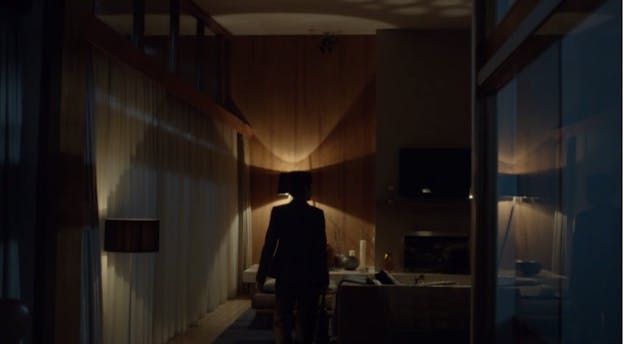
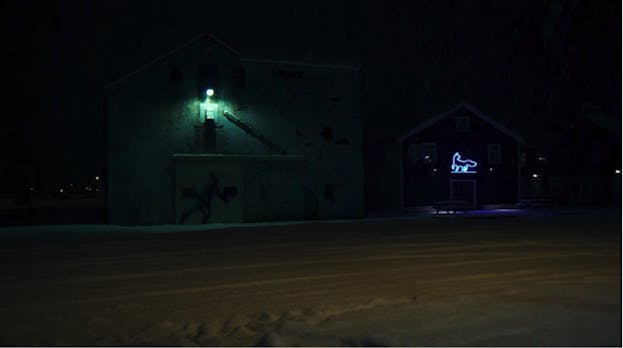
Even those interiors we know best seem to confuse boundaries between inside and outside, homey and hostile. Most of the art inside is of the nature outside: polar bears, icescapes.
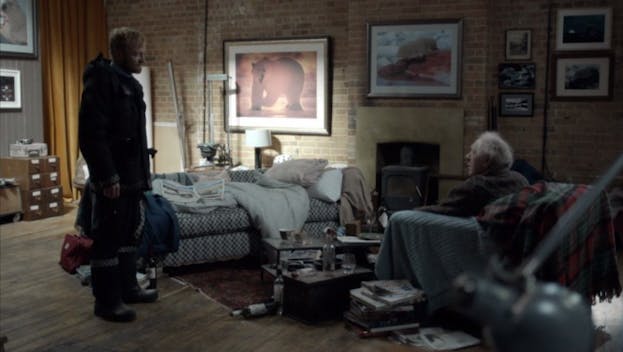
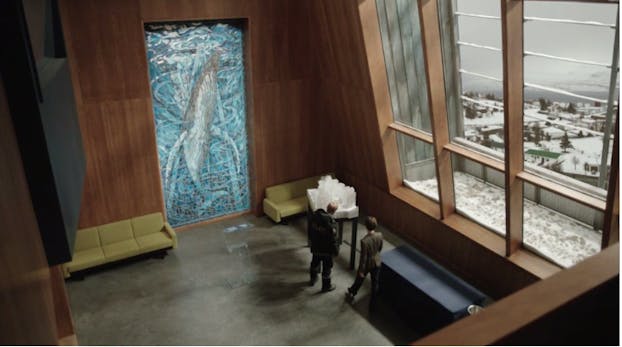
That basic—and, in this climate, entirely lethal—stylistic confusion of inside and outside plays out at the thematic level, too: that the governor of Fortitude plans to improve the town’s economic fortunes by attracting tourism with a glacier hotel is a brilliant metaphor for “Fortitude”’s icy concept of shelter and belonging. Here she is, showing the model to the sheriff Dan Anderssen:
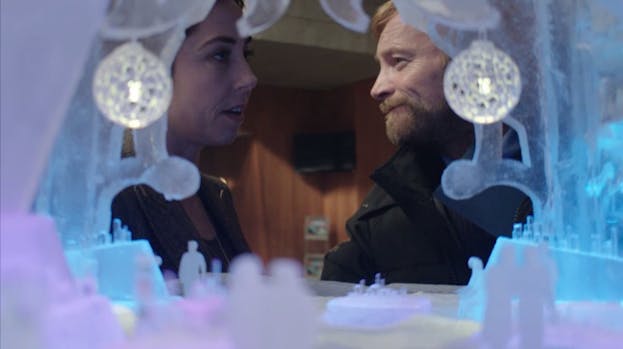
The shot positions us “inside” the glacier hotel looking “out” at them, though of course the relations are confused; we may be notionally inside the model hotel, which is itself inside the larger building, but the experience is one of being outside looking in. Even the inside is outside. Here’s what it looks like from their point of view:
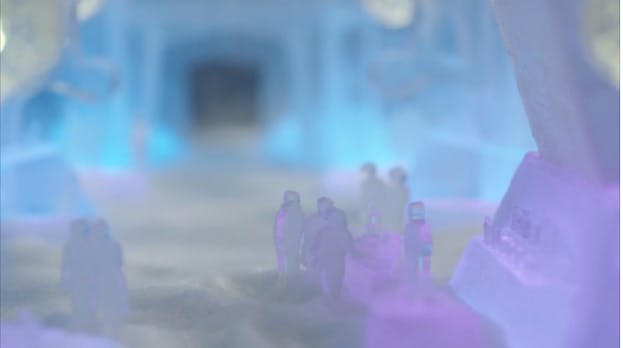
“Fortitude” inverts interiors and exteriors visually, then, as well as psychically. Whatever codes of belonging exist are less in-group behaviors typical of small-town life than collected out-group behaviors. That’s perhaps because this is a bizarre place, a small town whose frame of reference is global rather than local, or even national. Fortitude’s snowy, undifferentiated blankness is a twist on the organizing function of national character. If British shows tend to be almost as impossibly, irrepressibly British in their landscapes as American shows are American and Scottish shows are Scottish, “Fortitude” is neither—it’s an un-nation wildly unfriendly to the kind of human geography that makes borders and countries meaningful.
This was deliberate—Donald rejected Siberia and Alaska as possible settings for “Fortitude” because they’d be too Russian and American, respectively. It’s the blankness of the history that interests him: “There’s no indigenous population in Svalbard,” Donald says. “Almost everybody has come there from somewhere else. And it’s a small community, it’s a close, tight-knit community, and it’s far from help.”
That the two newcomers to Fortitude are British and American matters: Their national identities scan as loud against the town’s muted background. Vincent Rattrey (Luke Treadaway), a British research scientist, introduces himself as an expert on “apex predators”—as in badgers. He’s effectively brought small mammal cred to a polar bear fight. The U.S. detective Morton seems more dangerous, but he arrives too late in the pilot and too early in the mystery. His American-ness is slightly attenuated by the fact that he technically represents British interests, but what he lacks in Yankee swagger he makes up for in skill. Wily and charismatic, he’s good at extracting information through a combination of charm and abuse. He functions as both good cop and bad cop to Fortitude’s sheriff.
Still, the first shot of him in Fortitude doesn’t bode well:
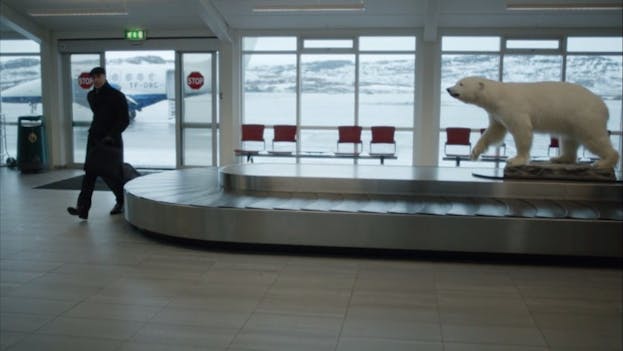
Tucci’s Morton is certainly sharp, and in fascinating discord with the community he’s ostensibly investigating, though I’d add that he’s also, on occasion, impressively diplomatic. Still, the specifically un-American amalgam of nationalities in “Fortitude” yields a community so existentially brittle that even Morton—by any objective measure a quiet, canny, wry presence—is horrifically disruptive. He systematically punctures the fragile myths Fortitude has about itself: that no one is allowed die there; that affairs are conducted according to open and uncomplicated free-love principles; that the prolonged periods of light and dark foster euphoria, not depression; and that all it takes for a utopian society is for everyone to have a job. It’s a delicate ideological ecosystem, and he upsets it.
Alas, Morton’s charm, skill, and insight are for naught; the detective dies in “Fortitude”’s penultimate episode—and with him dies the promise that order will be restored. Far greater than Morton’s disruption to Fortitude is the threat, present from the beginning, of a mammoth carcass thawing inscrutably in the dark. That early shot of Morton opposite the polar bear also both hints at “Fortitude”’s larger project and cleverly misleads. This isn’t a show about man vs. monster, or even man vs. nature. It’s about forces so much bigger, slower, and more inexorable that polar bears shrink to wasps in comparison. Elena’s speech about monsters in the pilot proved, in retrospect, to be as silly as it seemed: The threat was never a mammoth, or even a polar bear—it was the cumulative weight of small, incremental things: larva. Temperature. Time.
The show deploys two timescales against each other, one geological, one human. Crime investigation—when pitted against the former—looks suddenly absurd. The camera’s sometimes haphazard decisions, especially as we experience them early on, are perhaps symptomatic of that central tension between human and other scales; whatever perspective it’s animating, it isn’t the one we’d use to make meaning. Crime shows, Donald says, “[reveal] things that are deeper and more important than the crime itself. What interests me about procedurals and cop shows is the way they crack open the human heart and look at the stuff that’s hidden in there.” “Fortitude” cranks up that machinery, amplifies it, and then asks—as the permafrost melts—whether the human heart is even, in the smallest way, the point.
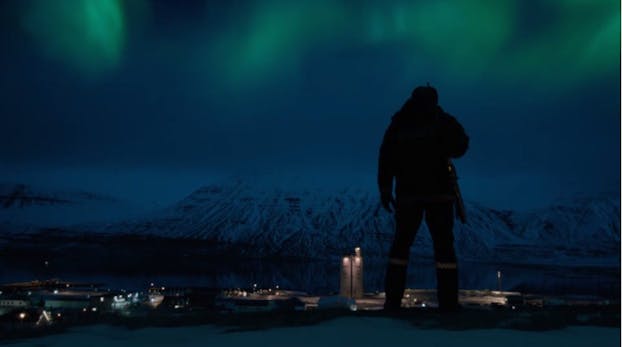
This post has been updated.
